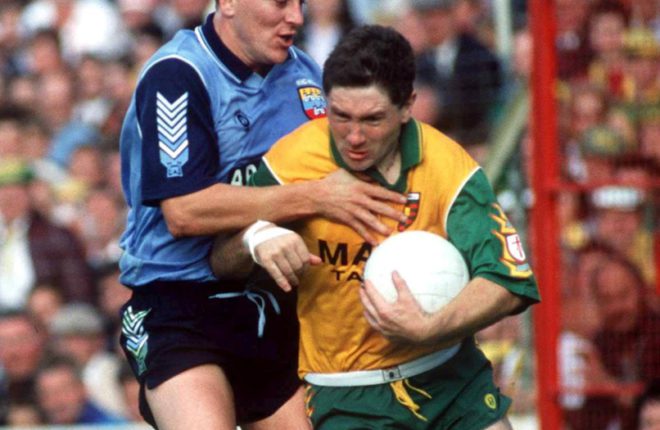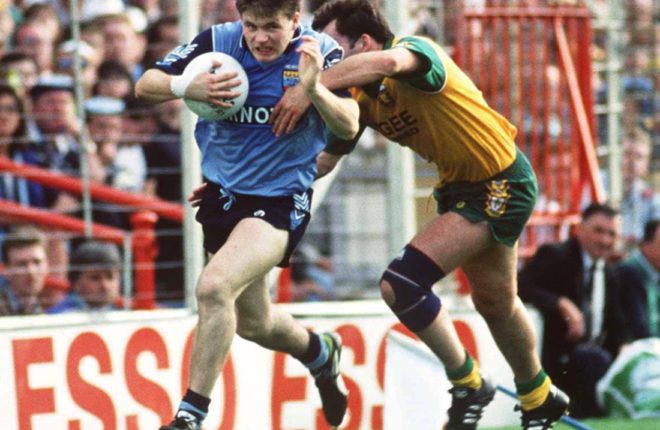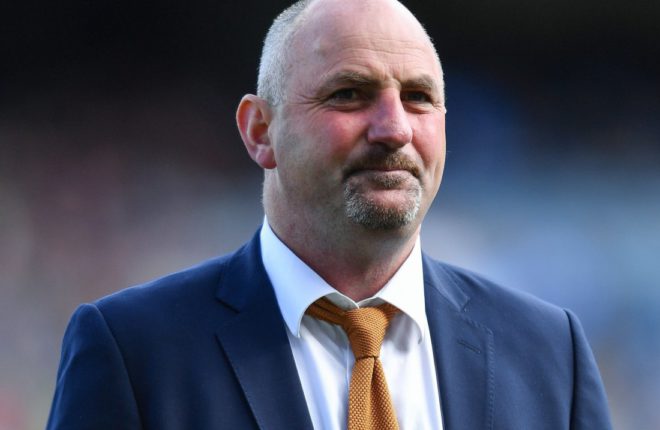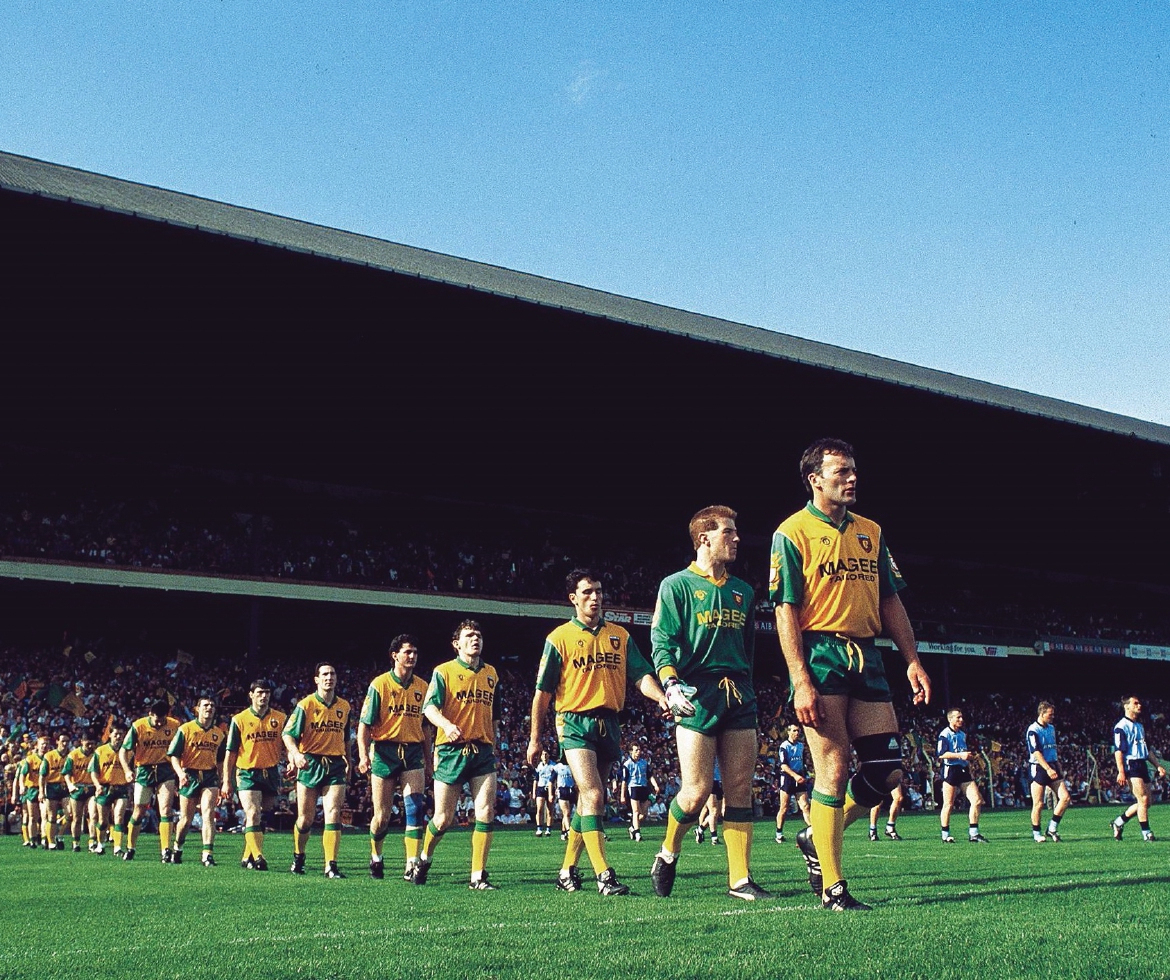It’s 30 years since Sam Maguire made his first journey to Donegal. Part of that breakthrough team was defender Noel Hegarty who looks back on what made the difference. Michael McMullan writes…
NOEL Hegarty puts Donegal’s 1992 success down to a four-week period of savage training before the Ulster final that tuned a fitness level the rest of Ireland couldn’t match.
They were sick of limp performances in Clones.
In the opening game of the championship, they were terrorised by Cavan’s Fintan Cahill before Martin McHugh’s monster free edged them ahead only for Damian O’Reilly to force a replay that Donegal won handy on home soil.

TIME TO SHAPE UP…Martin McHugh laid down the gauntlet to the Donegal squad after their Ulster semi-final win over Fermanagh
The semi-final paired them with Fermanagh and it took Donegal until the eighth minute of the second half to edge themselves in front before romping to a 16-point win.
It wasn’t enough. Martin McHugh stood up in the Healy Park dressing room and read the riot act.
“He said this is a waste of time,” recalls Noel Hegarty, who was 22 at the time.
“McHugh said we’ll be beat because we are not near fit enough, so we trained like f**k for the next three of four weeks.”
Barring the odd good result against the better teams, Donegal were not at the top level.
For the next two and half weeks, McEniff and trainer Anthony Harkin put the squad through hell before tapering down for the decider.
“The ball was thrown away,” Hegarty remembers of the core part of the sessions comprising of laps and double laps of MacCumhaill Park.
There would be a break for football before another installment of hell.
“Ballybofey was a big pitch and if it is a double lap, you are going to be found out. It was unbelievably hard and there was no place to hide.”
Short sprints didn’t have the same impact; in the long runs there was nowhere to hide.
Looking back, Hegarty feels the exercise was training the mind as much as anything else.
And they needed it. In the final against league champions Derry, they lost Tony Boyle to injury and had John Cunningham sent off for a lunge at Dermot McNicholl before half time with the sides level.
“The chips were down, so we said we’d have a go at it again to see. It was one of those days that it goes for you,” said Hegarty.
With Tommy Ryan, Martin McHugh and Declan Bonner all chipping in with scores, Donegal turned the tables and were on their way to Croke Park.
“We were super fit going into that Ulster final and we trained very hard for the (All-Ireland) semi-final,” Hegarty adds.
“We played very poorly against Mayo, but we hadn’t won in Croke Park and we were nervous. But once we got the win the monkey was off our back,” he said of their four-point win.
The Ulster champions had pushed Meath for long periods in the semi-final two years earlier and this time, despite being wasteful, they were heading for the third Sunday in September.
They had an old foe waiting for them in the final. Clare created shockwaves by defeating Kerry to land the silver in Munster, but Dublin were a step too far.
Hegarty was content it was going to be a clash with Dubs. His thoughts went back to their April league quarter-final clash and how they were cruising until Paul Clarke and Vinny Murphy struck for late goals.
“We were winning easy that day, but it was a killer one to take. We were still smarting by the way they beat us,” he said of their 3-6 to 1-10 defeat on a day when the Ulster men took as many positives as negatives into their championship campaign.
“That was in the back of our minds we had their number and were going to beat them that we were that far ahead of them in a big match.”
Two years ago, it was his first season in the Donegal senior panel. However, after not being selected on the match day panel for their first game of the season, he pulled out of the squad and missed out on a first Ulster medal.
The McKenna Cup came knocking in 1991 and 12 months down the line he was getting revved up to step into the whitest of championship heat.
Hegarty describes Brian McEniff as a “great servant” of football in the county in a lifetime that saw him play for the county; manage the team across different stints and fulfill the role of chairman.
“He’d be managing and playing his whole life and he’d be a very shrewd man inside and outside of football,” Hegarty said of his manager’s influence.
Noel came from a family of 12, scattered across the world – America, Australia and London. It must’ve been a somewhat impossible task of furnishing every one with tickets.
“In fairness to Brian, he was very organised about things like that and tickets were one of the first things sorted out,” Hegarty remembers.
As the rest of the county was exploding into a footballing frenzy, McEniff’s skills away from the training field were called into action.
The Donegal players were urged to turn down offers to officially open shops and pubs, as was going on at the time. The icons of the county were seen as hot property, but, inside the camp, it was about playing the game and not the occasion.
“We tried to keep out of it as much as we could,” he said. “Even when we went to Dublin for the game, we were staying out in the Grand Hotel in Malahide, away from everything.”
As hordes of green and gold clad Donegal fans transcended on Dublin city centre, McEniff’s men were encamped in their own wee cocoon. The chance to bring Sam Maguire back to the county was firmly in their sights. It was the only show in town.
There was a downside to their preparation, with the news that Martin Shovlin was struggling with an injury and was in danger of missing out on their greatest hour.
On the morning of the final a fitness test confirmed the worst. The Naomh Ultan man was out of contention.
“Poor Martin, he served for a long number of years for Donegal. He was a good soldier and for him to miss out, it was terrible for him.”
As a door closes, it opens for someone else. John Joe Doherty, like many in the county at the time, had spent time in Paris working on the new-look Euro Disney project.
On that morning in Malahide, Doherty was named in the starting 15 for their date with the Dubs, stepping in at corner-back, with Barry McGowan pushing out to wing-back.
“He had a groin injury and he tried to train with it,” Hegarty remembers of his club mate’s progress. “When he got it sorted out, he trained the whole year and got himself into fantastic shape. He really pushed to get onto the team.”
Doherty didn’t look out of place and was as fit as anyone else. The final piece of the jigsaw was complete.
Watching the 1992 All-Ireland final and how it developed was a tale of a convincing win. Twelve months earlier, Down had beaten them out the gate in Clones.
“When Ulster teams weren’t winning, that breakthrough from Down was huge,” Hegarty states. “Once Down won an All-Ireland and any day you beat them, you’d figure ‘Jesus I’m up there’. It definitely helped Ulster with Down winning.”
It was a nervous start with the Dubs shooting into an early two-point lead before Martin McHugh kicked a first Donegal score after his brother James’ dipping shot came off the crossbar.
Dublin’s attacking half-back trio of Paul Curran, Keith Barry and Eamonn Heary was their key line. In the weeks coming up to the final, Martin McHugh’s detail was to make Barr worry about his number one job – defending.
Naomh Columba won the Dr Maguire Cup in 1990, one of six final appearances in nine years, and there was an intense rivalry with neighbours Kilcar.
With Hegarty, John Joe Doherty and the McHugh brothers sharing a lift to training, a bond was built that added to the overall Donegal challenge for the top honours.
“We used to have great craic in the car,” Hegarty recalls. “We became great friends after that for a lot of years. Before that, the rivalry was very intense.”
Now in the Croke Park cauldron, Donegal began to grow into the All-Ireland final. There was the addition of free-taker Manus Boyle to the mix to answer their wasteful woe of the struggle with Mayo, with Ulster final hero Tommy Ryan the man to miss out.
Having played at centre forward for the county minors and much of his club football at midfield, Hegarty had the reputation as a fine footballer.
He started the season at wing-back with a point in the final quarter of their draw with Cavan, but as McEniff reshaped his rearguard, Hegarty found himself a home at corner-back.
A more settled Donegal began to grow into the first half. But they needed a stroke of fortune.

FAMILIAR FACE…Hegarty kept Dessie Farrell to a point in the final, a player he got to know growing up
Noel’s opponent in the final was Dessie Farrell and he’d spend many summers in the Carrick area from where his mother Anne hailed and trained with Naomh Columba.
Dublin led 0-2 to 0-1 when a trademark free from Keith Barr landed in the Donegal defence. After bobbling between a couple of sets of hands, the leather ended up with Farrell.
After brushing past Hegarty, he pulled his shot wide but referee Tommy Sugrue awarded a penalty.
Charlie Redmond’s penalty miss was deemed as ‘poetic justice’ and Donegal were off the hook. Canning and Colm O’Rourke felt it was a soft penalty and 30 years on Hegarty agrees.
“If they’d have scored the penalty we could’ve been in big bother. I would’ve been very worried, because I don’t believe it was a penalty,” Hegarty said. “Their tails would’ve been up and it would’ve been hard for us to come back.”
The sides were level twice in the first half but the second of Manus Boyle’s nine-point Man of the Match haul put Donegal into a 0-7 to 0-5 lead after 25 minutes and they didn’t look back.
McEniff’s men led by both five and four points at different stages with a Paul Clarke free leaving just the kick of a ball in it with two minutes to go. The ghosts of those two late goals were never far away from the minds of Donegal folk, but it looked like Sam was for the hills.
Hegarty doesn’t agree.
“We tried to get the fourth point,” he stressed.
In the days before the high-tech scoreboard at headquarters, there was an analogue clock at the back of the Canal End terrace. As it ticked towards a quarter to five, you always knew the game was going down the stretch.
“I tried to look at the clock. It might’ve looked comfortable, but it wasn’t that comfortable,” Hegarty admits.
“I couldn’t figure what time was left and I remember asking John Joe (Doherty) and he said there were a couple of minutes to go.”
Bonner’s fist pump as he kicked the insurance point said it all. Donegal were going the whole way to dreamland.
There were scenes of sheer elation as the players were caught up in an explosion of fans. But for Hegarty, the moment they carried the cup in the county was that snapshot he will never forget.
“We got the train to Sligo and all the towns the train went through, there were people out from all the different counties, which was unbelievable,” he states.
As the bus approached Bundoran the squad got and walked the cup across the Drowes River and into the county.
“It was wall to wall people and the guards trying to keep them back…it was bedlam,” he said of that magical Monday.
The following day, the cavalcade snaked its way through Mountcharles, Dunkineely, Kilcar and Killybegs. Eventually the cup made its way into Glencolmcille – on its way to Ardara. Hegarty’s journey was complete.
The following year, Donegal surrendered their titles to Derry in the rain of Clones. The Oakleafers still maintain they’d have won the game regardless of the conditions and it was their time, but Donegal beg to differ.
Hegarty was suspended. Tony Boyle and Donal Reid were missing, while Martin Gavigan and Anthony Molloy were unfit to start.
“On that wet day alone, imagine having Gavigan there to stop (Anthony) Tohill coming through the middle,” Hegarty stated. “The Derry men say they would’ve beaten us anyway, so we’ll never know. That’s the ifs and buts, but once they beat us in 1993, that was the end of that team.”

25 YEARS ON…Hegarty pictured as the Donegal 1992 team are guests of honour at the 2017 All-Ireland Final
Looking back, he has never watched the 1992 All-Ireland in any great detail, setting for the bits and pieces he saw over the years.
He kept his jersey from the Dublin and Mayo games. The rest he swapped, with a dozen jerseys from different counties gathering dust.
“It’s hard to believe it’s 30 years,” he concludes.
For Hegarty, when he’s not building, farming or helping in the family hospitality business in Carrick, he is coaching underage.
“I enjoy it,” he states. Every year, he takes a youth team. This season, it’s the u-15s who will benefit from his tutelage.
Would he love to be playing for Donegal still? Certainly if it’s the fast counter-attacking game, that excites him. The over and back passing does nothing for him.
Once a footballing defender, always a footballing defender.
Receive quality journalism wherever you are, on any device. Keep up to date from the comfort of your own home with a digital subscription.
Any time | Any place | Anywhere












